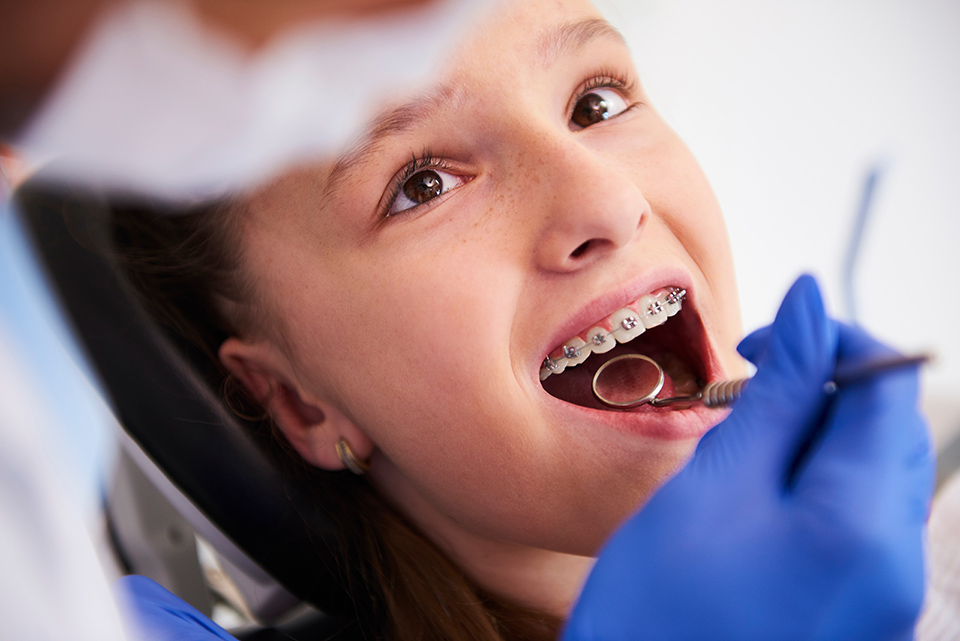Resource Library
Start Reading

For many children, getting braces is a rite of passage. Mouths full of metal are often common sights in middle schools, but older or younger kids—and even adults—may need braces at some point.
Usually, children who need to see a kids’ orthodontist receive a referral from their pediatric dentist, usually between the ages of seven and ten when their permanent teeth start coming in, but that’s not always the case.
Penn Dental Family Practice’s orthodontists have received an additional two to three years of education beyond dental medicine school and are specially trained to treat problems with your child’s bite or tooth alignment. Even if your child is apprehensive about the idea of getting braces, you can rest assured you are in good hands every step of the way.
 Your child may need braces for several reasons. The most common include:
Your child may need braces for several reasons. The most common include:
Although many of the issues that require orthodontic treatment are genetic, sometimes they are a result of behaviors like thumb sucking, or because of an accident, or losing their baby teeth too soon.
And, while one of the benefits of orthodontics is an attractive smile with straight, properly spaced teeth, aesthetics aren’t the primary reason young children need to see an orthodontist. Correcting abnormalities of the jaw or positioning with the teeth allows everything to function properly, reducing the likelihood of pain or oral health issues. Teeth that are too crowded, for example, can be hard to clean properly. It’s easier for bacteria and plaque to build up in tight spaces, increasing the risk of tooth decay and gum disease.
Orthodontic treatment can also help your child speak. Problems with the teeth and jaw contribute to many speech challenges; correcting them can help your child be better understood and more confident.
 Every child is different, and there’s no set age for when they should get braces.
Every child is different, and there’s no set age for when they should get braces.
The American Association of Orthodontists (AAO) recommends, however, that all children should see a kids’ orthodontist for an evaluation by age seven. Around that point, the doctor can get a sense of how your child’s permanent teeth will come in, whether there is adequate space for their teeth, and whether there are any issues with their jaw that could be problematic as they grow.
In most cases, the orthodontic exam at age seven is just a checkup to determine if there are any issues and if so, make a recommended treatment plan. This includes determining when treatment should start and how long it will take. In most cases, it will be a few years before treatment starts, with periodic check-ins in the meantime.
Even though the AAO recommends an initial exam at age seven, it’s not too late if your child is a bit older. Most children start orthodontic treatment between ages 9 and 16, so waiting to see the kids’ orthodontist doesn’t mean treatment will begin too late or won’t be successful. With that said, it’s important to see the orthodontist before all of your child’s permanent teeth come in. Many treatments are most successful if they are done before your child stops growing.
 Some children see an orthodontist at the recommendation of their pediatric dentist, but parents can also make an appointment themselves. If you suspect something isn’t right with your child’s teeth or jaw, having an orthodontist take a look is a good idea.
Some children see an orthodontist at the recommendation of their pediatric dentist, but parents can also make an appointment themselves. If you suspect something isn’t right with your child’s teeth or jaw, having an orthodontist take a look is a good idea.
During the initial exam, the orthodontist will likely do the following:
Even if treatment is needed, it’s not likely to begin right away if your child is still young. And, not all treatment requires braces. Some children may need to have teeth extracted, for example, or require a palatal expander to widen their upper jaw and correct their bite. Palatal expanders only work while a child is still growing, underscoring the importance of early treatment.
PDFP recommends families follow the AAO recommendation and make an appointment for an orthodontic evaluation for their children at age seven. Our team of pediatric dentists works closely with orthodontists, ensuring your child receives the most comprehensive dental care possible, in a kid-friendly environment where they feel comfortable.
Make an appointment today, or call 215-898-PDFP (7337) with questions.